Evaluating Sustainability in Hospitality and Tourism: A Case Study
VerifiedAdded on 2023/01/04
|9
|2599
|130
Essay
AI Summary
This essay delves into the crucial issue of sustainability within the hospitality and tourism industries. It begins by defining these sectors and highlighting their significance. The core of the essay involves a case study that critically evaluates the extent to which the principles of sustainable tourism align with those of sustainable development. It explores principles such as resource sustainability, waste reduction, biodiversity maintenance, and community support, alongside environmental, economic, and social dimensions. The essay also examines the principles of sustainable development, including living within environmental limits, promoting good governance, and ensuring a healthy society. The conclusion emphasizes the interconnectedness of these principles and their role in fostering economic growth, environmental protection, and enhanced visitor experiences, ultimately contributing to the long-term success of the hospitality and tourism sectors.
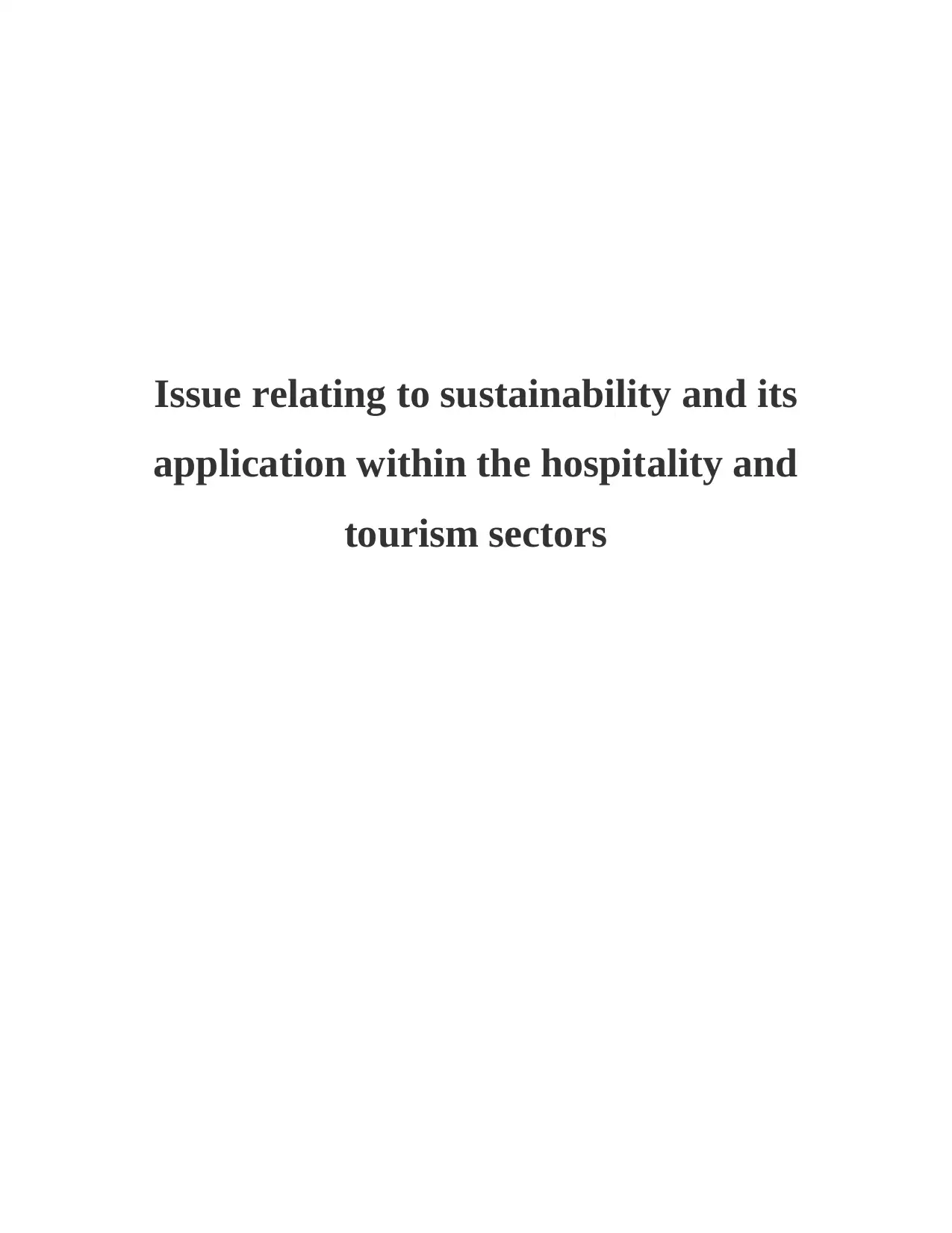
Issue relating to sustainability and its
application within the hospitality and
tourism sectors
application within the hospitality and
tourism sectors
Paraphrase This Document
Need a fresh take? Get an instant paraphrase of this document with our AI Paraphraser
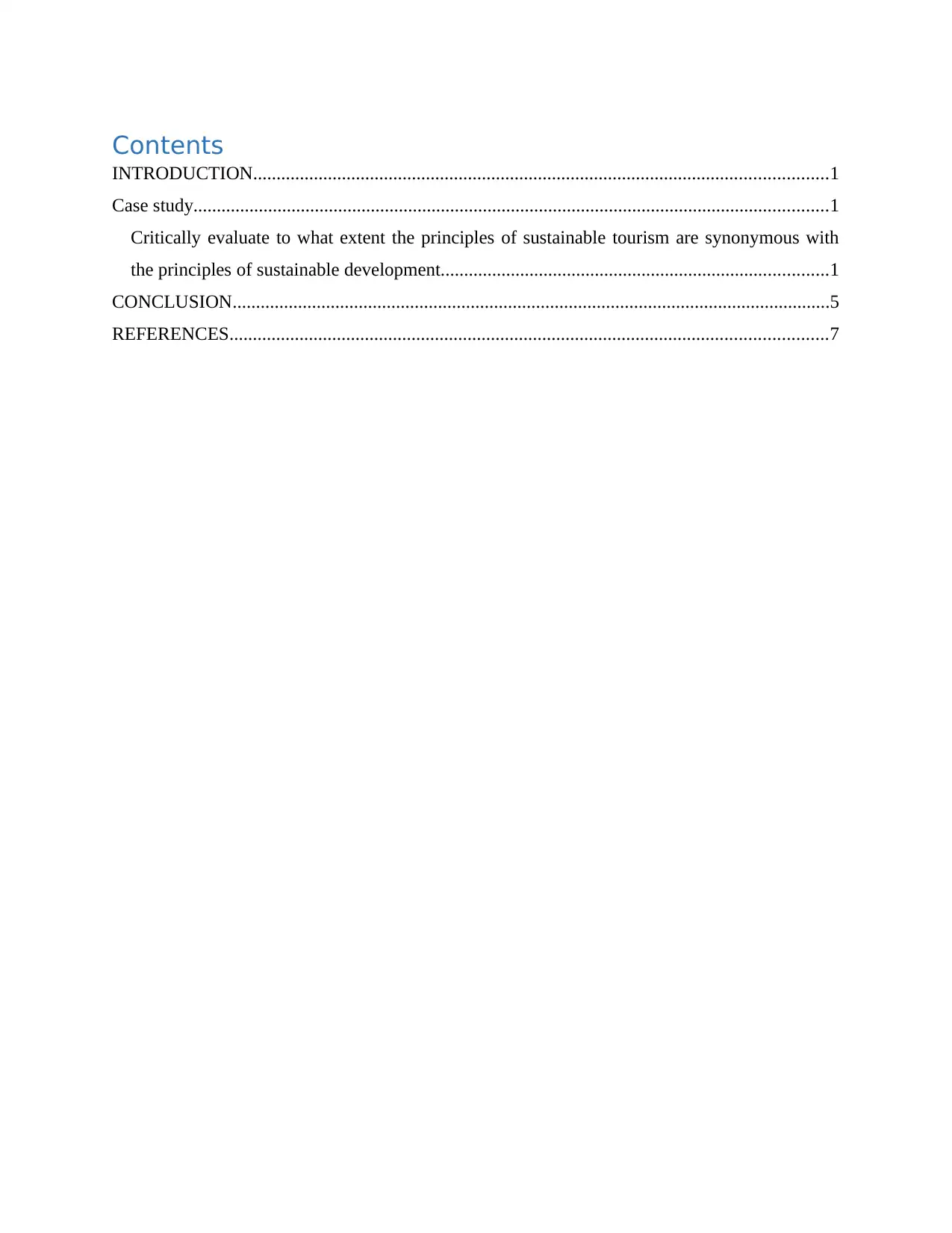
Contents
INTRODUCTION...........................................................................................................................1
Case study........................................................................................................................................1
Critically evaluate to what extent the principles of sustainable tourism are synonymous with
the principles of sustainable development...................................................................................1
CONCLUSION................................................................................................................................5
REFERENCES................................................................................................................................7
INTRODUCTION...........................................................................................................................1
Case study........................................................................................................................................1
Critically evaluate to what extent the principles of sustainable tourism are synonymous with
the principles of sustainable development...................................................................................1
CONCLUSION................................................................................................................................5
REFERENCES................................................................................................................................7
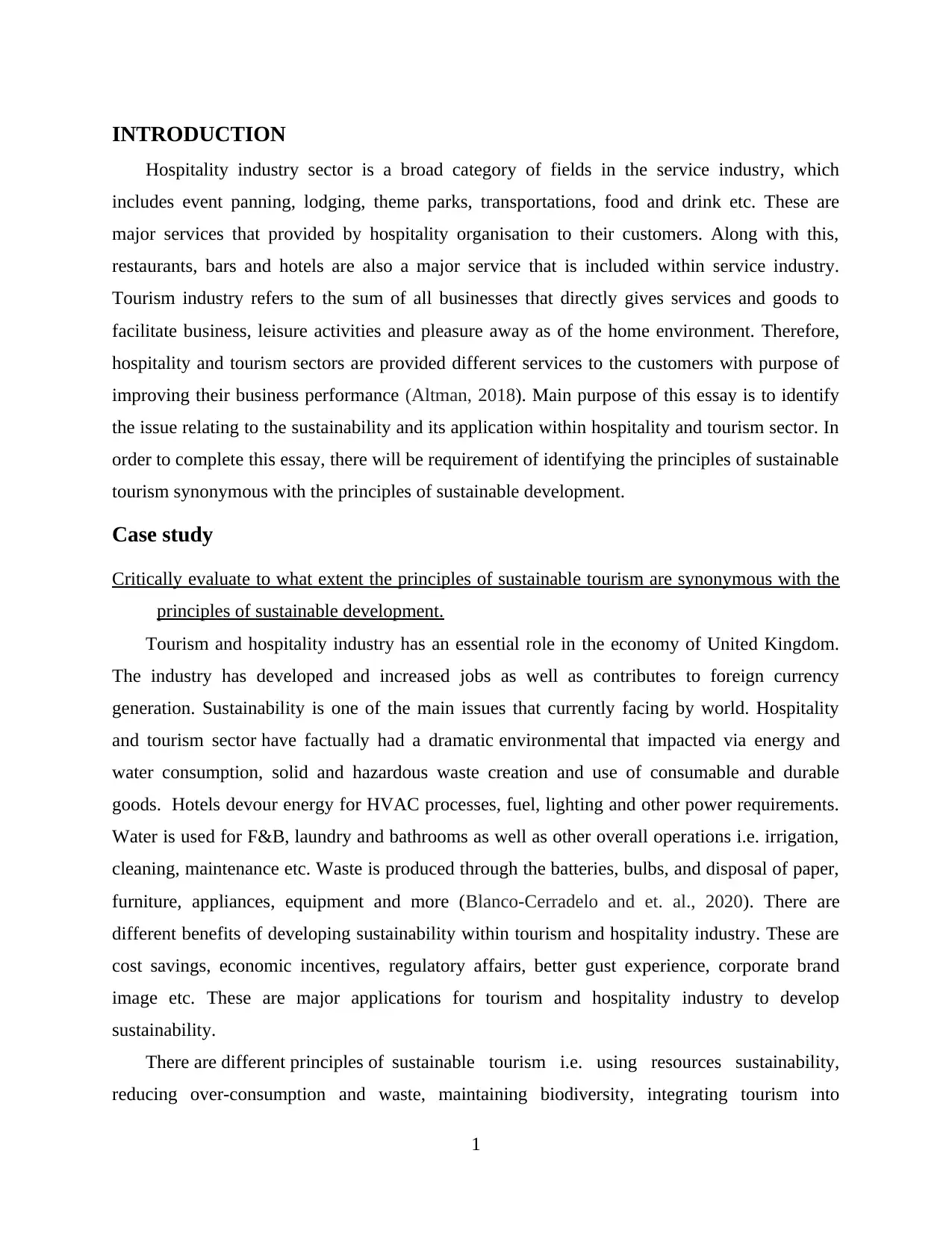
INTRODUCTION
Hospitality industry sector is a broad category of fields in the service industry, which
includes event panning, lodging, theme parks, transportations, food and drink etc. These are
major services that provided by hospitality organisation to their customers. Along with this,
restaurants, bars and hotels are also a major service that is included within service industry.
Tourism industry refers to the sum of all businesses that directly gives services and goods to
facilitate business, leisure activities and pleasure away as of the home environment. Therefore,
hospitality and tourism sectors are provided different services to the customers with purpose of
improving their business performance (Altman, 2018). Main purpose of this essay is to identify
the issue relating to the sustainability and its application within hospitality and tourism sector. In
order to complete this essay, there will be requirement of identifying the principles of sustainable
tourism synonymous with the principles of sustainable development.
Case study
Critically evaluate to what extent the principles of sustainable tourism are synonymous with the
principles of sustainable development.
Tourism and hospitality industry has an essential role in the economy of United Kingdom.
The industry has developed and increased jobs as well as contributes to foreign currency
generation. Sustainability is one of the main issues that currently facing by world. Hospitality
and tourism sector have factually had a dramatic environmental that impacted via energy and
water consumption, solid and hazardous waste creation and use of consumable and durable
goods. Hotels devour energy for HVAC processes, fuel, lighting and other power requirements.
Water is used for F&B, laundry and bathrooms as well as other overall operations i.e. irrigation,
cleaning, maintenance etc. Waste is produced through the batteries, bulbs, and disposal of paper,
furniture, appliances, equipment and more (Blanco-Cerradelo and et. al., 2020). There are
different benefits of developing sustainability within tourism and hospitality industry. These are
cost savings, economic incentives, regulatory affairs, better gust experience, corporate brand
image etc. These are major applications for tourism and hospitality industry to develop
sustainability.
There are different principles of sustainable tourism i.e. using resources sustainability,
reducing over-consumption and waste, maintaining biodiversity, integrating tourism into
1
Hospitality industry sector is a broad category of fields in the service industry, which
includes event panning, lodging, theme parks, transportations, food and drink etc. These are
major services that provided by hospitality organisation to their customers. Along with this,
restaurants, bars and hotels are also a major service that is included within service industry.
Tourism industry refers to the sum of all businesses that directly gives services and goods to
facilitate business, leisure activities and pleasure away as of the home environment. Therefore,
hospitality and tourism sectors are provided different services to the customers with purpose of
improving their business performance (Altman, 2018). Main purpose of this essay is to identify
the issue relating to the sustainability and its application within hospitality and tourism sector. In
order to complete this essay, there will be requirement of identifying the principles of sustainable
tourism synonymous with the principles of sustainable development.
Case study
Critically evaluate to what extent the principles of sustainable tourism are synonymous with the
principles of sustainable development.
Tourism and hospitality industry has an essential role in the economy of United Kingdom.
The industry has developed and increased jobs as well as contributes to foreign currency
generation. Sustainability is one of the main issues that currently facing by world. Hospitality
and tourism sector have factually had a dramatic environmental that impacted via energy and
water consumption, solid and hazardous waste creation and use of consumable and durable
goods. Hotels devour energy for HVAC processes, fuel, lighting and other power requirements.
Water is used for F&B, laundry and bathrooms as well as other overall operations i.e. irrigation,
cleaning, maintenance etc. Waste is produced through the batteries, bulbs, and disposal of paper,
furniture, appliances, equipment and more (Blanco-Cerradelo and et. al., 2020). There are
different benefits of developing sustainability within tourism and hospitality industry. These are
cost savings, economic incentives, regulatory affairs, better gust experience, corporate brand
image etc. These are major applications for tourism and hospitality industry to develop
sustainability.
There are different principles of sustainable tourism i.e. using resources sustainability,
reducing over-consumption and waste, maintaining biodiversity, integrating tourism into
1
⊘ This is a preview!⊘
Do you want full access?
Subscribe today to unlock all pages.

Trusted by 1+ million students worldwide
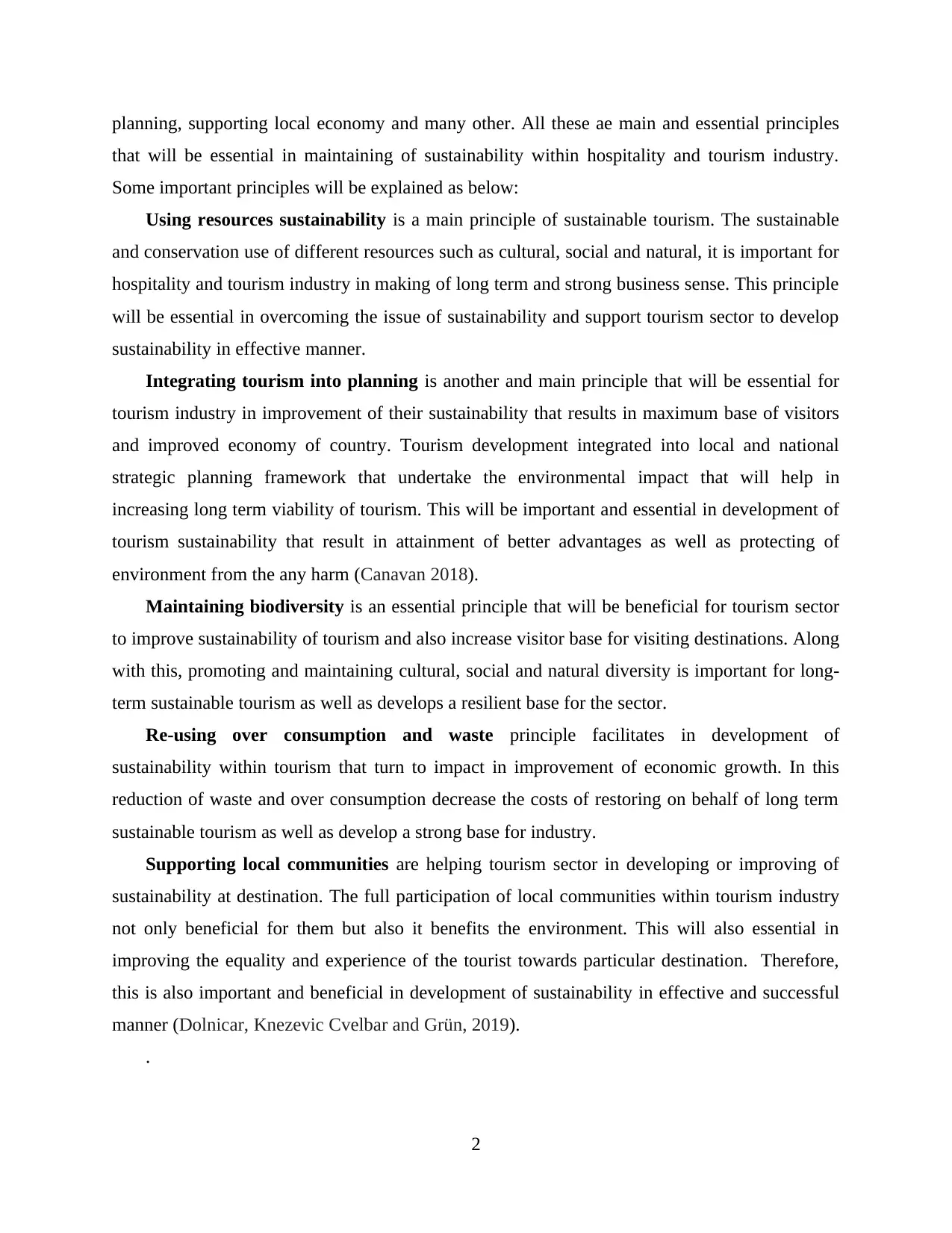
planning, supporting local economy and many other. All these ae main and essential principles
that will be essential in maintaining of sustainability within hospitality and tourism industry.
Some important principles will be explained as below:
Using resources sustainability is a main principle of sustainable tourism. The sustainable
and conservation use of different resources such as cultural, social and natural, it is important for
hospitality and tourism industry in making of long term and strong business sense. This principle
will be essential in overcoming the issue of sustainability and support tourism sector to develop
sustainability in effective manner.
Integrating tourism into planning is another and main principle that will be essential for
tourism industry in improvement of their sustainability that results in maximum base of visitors
and improved economy of country. Tourism development integrated into local and national
strategic planning framework that undertake the environmental impact that will help in
increasing long term viability of tourism. This will be important and essential in development of
tourism sustainability that result in attainment of better advantages as well as protecting of
environment from the any harm (Canavan 2018).
Maintaining biodiversity is an essential principle that will be beneficial for tourism sector
to improve sustainability of tourism and also increase visitor base for visiting destinations. Along
with this, promoting and maintaining cultural, social and natural diversity is important for long-
term sustainable tourism as well as develops a resilient base for the sector.
Re-using over consumption and waste principle facilitates in development of
sustainability within tourism that turn to impact in improvement of economic growth. In this
reduction of waste and over consumption decrease the costs of restoring on behalf of long term
sustainable tourism as well as develop a strong base for industry.
Supporting local communities are helping tourism sector in developing or improving of
sustainability at destination. The full participation of local communities within tourism industry
not only beneficial for them but also it benefits the environment. This will also essential in
improving the equality and experience of the tourist towards particular destination. Therefore,
this is also important and beneficial in development of sustainability in effective and successful
manner (Dolnicar, Knezevic Cvelbar and Grün, 2019).
.
2
that will be essential in maintaining of sustainability within hospitality and tourism industry.
Some important principles will be explained as below:
Using resources sustainability is a main principle of sustainable tourism. The sustainable
and conservation use of different resources such as cultural, social and natural, it is important for
hospitality and tourism industry in making of long term and strong business sense. This principle
will be essential in overcoming the issue of sustainability and support tourism sector to develop
sustainability in effective manner.
Integrating tourism into planning is another and main principle that will be essential for
tourism industry in improvement of their sustainability that results in maximum base of visitors
and improved economy of country. Tourism development integrated into local and national
strategic planning framework that undertake the environmental impact that will help in
increasing long term viability of tourism. This will be important and essential in development of
tourism sustainability that result in attainment of better advantages as well as protecting of
environment from the any harm (Canavan 2018).
Maintaining biodiversity is an essential principle that will be beneficial for tourism sector
to improve sustainability of tourism and also increase visitor base for visiting destinations. Along
with this, promoting and maintaining cultural, social and natural diversity is important for long-
term sustainable tourism as well as develops a resilient base for the sector.
Re-using over consumption and waste principle facilitates in development of
sustainability within tourism that turn to impact in improvement of economic growth. In this
reduction of waste and over consumption decrease the costs of restoring on behalf of long term
sustainable tourism as well as develop a strong base for industry.
Supporting local communities are helping tourism sector in developing or improving of
sustainability at destination. The full participation of local communities within tourism industry
not only beneficial for them but also it benefits the environment. This will also essential in
improving the equality and experience of the tourist towards particular destination. Therefore,
this is also important and beneficial in development of sustainability in effective and successful
manner (Dolnicar, Knezevic Cvelbar and Grün, 2019).
.
2
Paraphrase This Document
Need a fresh take? Get an instant paraphrase of this document with our AI Paraphraser
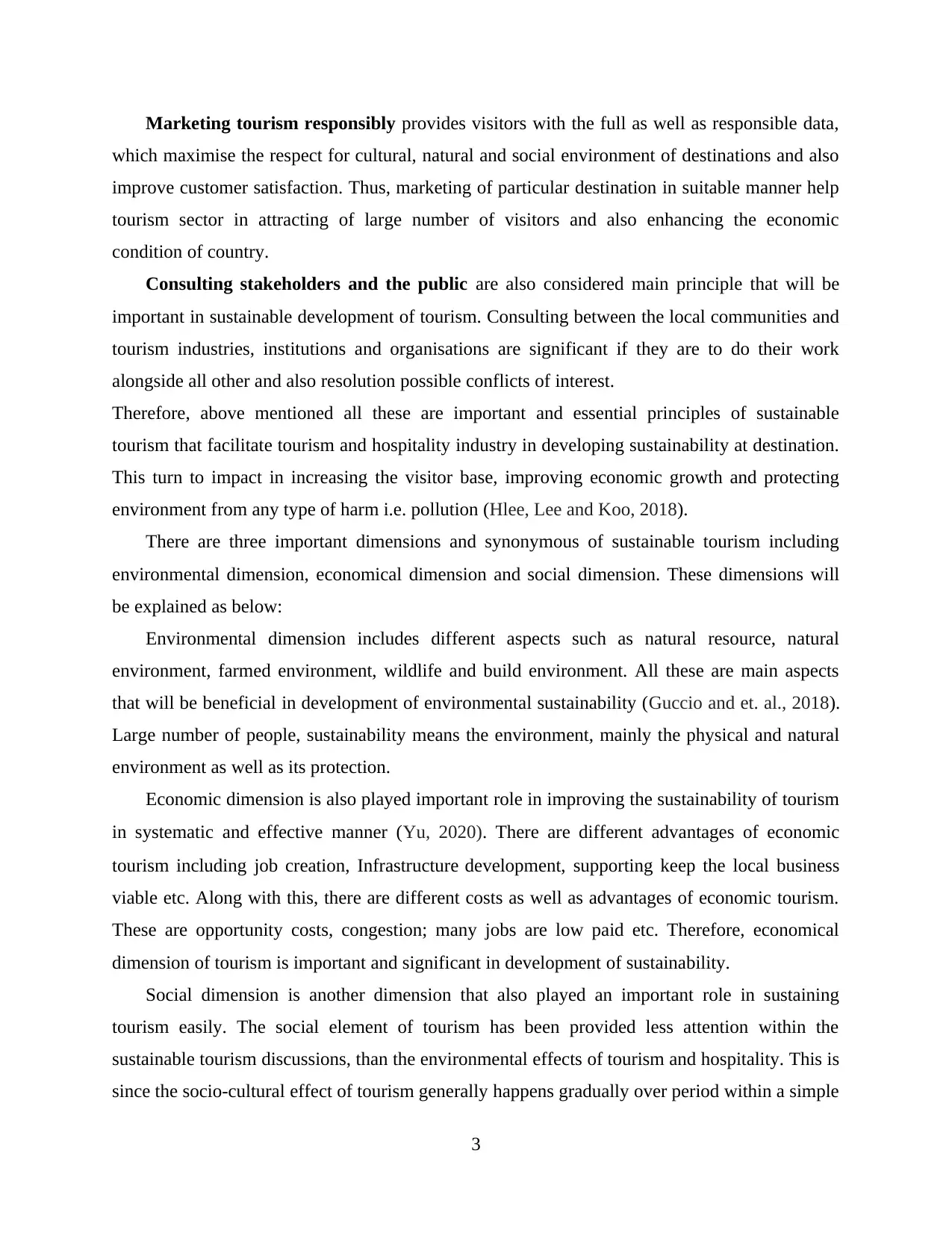
Marketing tourism responsibly provides visitors with the full as well as responsible data,
which maximise the respect for cultural, natural and social environment of destinations and also
improve customer satisfaction. Thus, marketing of particular destination in suitable manner help
tourism sector in attracting of large number of visitors and also enhancing the economic
condition of country.
Consulting stakeholders and the public are also considered main principle that will be
important in sustainable development of tourism. Consulting between the local communities and
tourism industries, institutions and organisations are significant if they are to do their work
alongside all other and also resolution possible conflicts of interest.
Therefore, above mentioned all these are important and essential principles of sustainable
tourism that facilitate tourism and hospitality industry in developing sustainability at destination.
This turn to impact in increasing the visitor base, improving economic growth and protecting
environment from any type of harm i.e. pollution (Hlee, Lee and Koo, 2018).
There are three important dimensions and synonymous of sustainable tourism including
environmental dimension, economical dimension and social dimension. These dimensions will
be explained as below:
Environmental dimension includes different aspects such as natural resource, natural
environment, farmed environment, wildlife and build environment. All these are main aspects
that will be beneficial in development of environmental sustainability (Guccio and et. al., 2018).
Large number of people, sustainability means the environment, mainly the physical and natural
environment as well as its protection.
Economic dimension is also played important role in improving the sustainability of tourism
in systematic and effective manner (Yu, 2020). There are different advantages of economic
tourism including job creation, Infrastructure development, supporting keep the local business
viable etc. Along with this, there are different costs as well as advantages of economic tourism.
These are opportunity costs, congestion; many jobs are low paid etc. Therefore, economical
dimension of tourism is important and significant in development of sustainability.
Social dimension is another dimension that also played an important role in sustaining
tourism easily. The social element of tourism has been provided less attention within the
sustainable tourism discussions, than the environmental effects of tourism and hospitality. This is
since the socio-cultural effect of tourism generally happens gradually over period within a simple
3
which maximise the respect for cultural, natural and social environment of destinations and also
improve customer satisfaction. Thus, marketing of particular destination in suitable manner help
tourism sector in attracting of large number of visitors and also enhancing the economic
condition of country.
Consulting stakeholders and the public are also considered main principle that will be
important in sustainable development of tourism. Consulting between the local communities and
tourism industries, institutions and organisations are significant if they are to do their work
alongside all other and also resolution possible conflicts of interest.
Therefore, above mentioned all these are important and essential principles of sustainable
tourism that facilitate tourism and hospitality industry in developing sustainability at destination.
This turn to impact in increasing the visitor base, improving economic growth and protecting
environment from any type of harm i.e. pollution (Hlee, Lee and Koo, 2018).
There are three important dimensions and synonymous of sustainable tourism including
environmental dimension, economical dimension and social dimension. These dimensions will
be explained as below:
Environmental dimension includes different aspects such as natural resource, natural
environment, farmed environment, wildlife and build environment. All these are main aspects
that will be beneficial in development of environmental sustainability (Guccio and et. al., 2018).
Large number of people, sustainability means the environment, mainly the physical and natural
environment as well as its protection.
Economic dimension is also played important role in improving the sustainability of tourism
in systematic and effective manner (Yu, 2020). There are different advantages of economic
tourism including job creation, Infrastructure development, supporting keep the local business
viable etc. Along with this, there are different costs as well as advantages of economic tourism.
These are opportunity costs, congestion; many jobs are low paid etc. Therefore, economical
dimension of tourism is important and significant in development of sustainability.
Social dimension is another dimension that also played an important role in sustaining
tourism easily. The social element of tourism has been provided less attention within the
sustainable tourism discussions, than the environmental effects of tourism and hospitality. This is
since the socio-cultural effect of tourism generally happens gradually over period within a simple
3
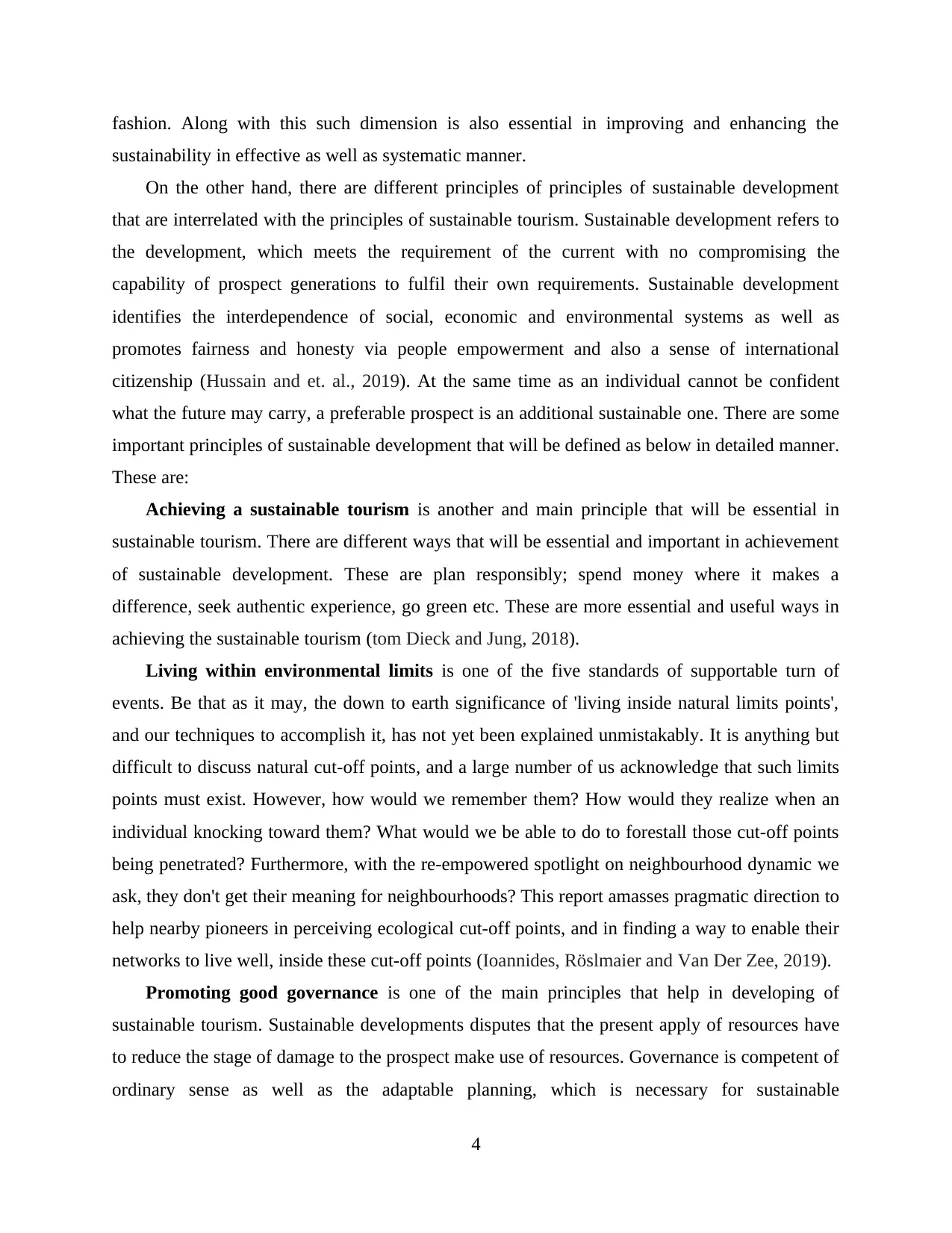
fashion. Along with this such dimension is also essential in improving and enhancing the
sustainability in effective as well as systematic manner.
On the other hand, there are different principles of principles of sustainable development
that are interrelated with the principles of sustainable tourism. Sustainable development refers to
the development, which meets the requirement of the current with no compromising the
capability of prospect generations to fulfil their own requirements. Sustainable development
identifies the interdependence of social, economic and environmental systems as well as
promotes fairness and honesty via people empowerment and also a sense of international
citizenship (Hussain and et. al., 2019). At the same time as an individual cannot be confident
what the future may carry, a preferable prospect is an additional sustainable one. There are some
important principles of sustainable development that will be defined as below in detailed manner.
These are:
Achieving a sustainable tourism is another and main principle that will be essential in
sustainable tourism. There are different ways that will be essential and important in achievement
of sustainable development. These are plan responsibly; spend money where it makes a
difference, seek authentic experience, go green etc. These are more essential and useful ways in
achieving the sustainable tourism (tom Dieck and Jung, 2018).
Living within environmental limits is one of the five standards of supportable turn of
events. Be that as it may, the down to earth significance of 'living inside natural limits points',
and our techniques to accomplish it, has not yet been explained unmistakably. It is anything but
difficult to discuss natural cut-off points, and a large number of us acknowledge that such limits
points must exist. However, how would we remember them? How would they realize when an
individual knocking toward them? What would we be able to do to forestall those cut-off points
being penetrated? Furthermore, with the re-empowered spotlight on neighbourhood dynamic we
ask, they don't get their meaning for neighbourhoods? This report amasses pragmatic direction to
help nearby pioneers in perceiving ecological cut-off points, and in finding a way to enable their
networks to live well, inside these cut-off points (Ioannides, Röslmaier and Van Der Zee, 2019).
Promoting good governance is one of the main principles that help in developing of
sustainable tourism. Sustainable developments disputes that the present apply of resources have
to reduce the stage of damage to the prospect make use of resources. Governance is competent of
ordinary sense as well as the adaptable planning, which is necessary for sustainable
4
sustainability in effective as well as systematic manner.
On the other hand, there are different principles of principles of sustainable development
that are interrelated with the principles of sustainable tourism. Sustainable development refers to
the development, which meets the requirement of the current with no compromising the
capability of prospect generations to fulfil their own requirements. Sustainable development
identifies the interdependence of social, economic and environmental systems as well as
promotes fairness and honesty via people empowerment and also a sense of international
citizenship (Hussain and et. al., 2019). At the same time as an individual cannot be confident
what the future may carry, a preferable prospect is an additional sustainable one. There are some
important principles of sustainable development that will be defined as below in detailed manner.
These are:
Achieving a sustainable tourism is another and main principle that will be essential in
sustainable tourism. There are different ways that will be essential and important in achievement
of sustainable development. These are plan responsibly; spend money where it makes a
difference, seek authentic experience, go green etc. These are more essential and useful ways in
achieving the sustainable tourism (tom Dieck and Jung, 2018).
Living within environmental limits is one of the five standards of supportable turn of
events. Be that as it may, the down to earth significance of 'living inside natural limits points',
and our techniques to accomplish it, has not yet been explained unmistakably. It is anything but
difficult to discuss natural cut-off points, and a large number of us acknowledge that such limits
points must exist. However, how would we remember them? How would they realize when an
individual knocking toward them? What would we be able to do to forestall those cut-off points
being penetrated? Furthermore, with the re-empowered spotlight on neighbourhood dynamic we
ask, they don't get their meaning for neighbourhoods? This report amasses pragmatic direction to
help nearby pioneers in perceiving ecological cut-off points, and in finding a way to enable their
networks to live well, inside these cut-off points (Ioannides, Röslmaier and Van Der Zee, 2019).
Promoting good governance is one of the main principles that help in developing of
sustainable tourism. Sustainable developments disputes that the present apply of resources have
to reduce the stage of damage to the prospect make use of resources. Governance is competent of
ordinary sense as well as the adaptable planning, which is necessary for sustainable
4
⊘ This is a preview!⊘
Do you want full access?
Subscribe today to unlock all pages.

Trusted by 1+ million students worldwide
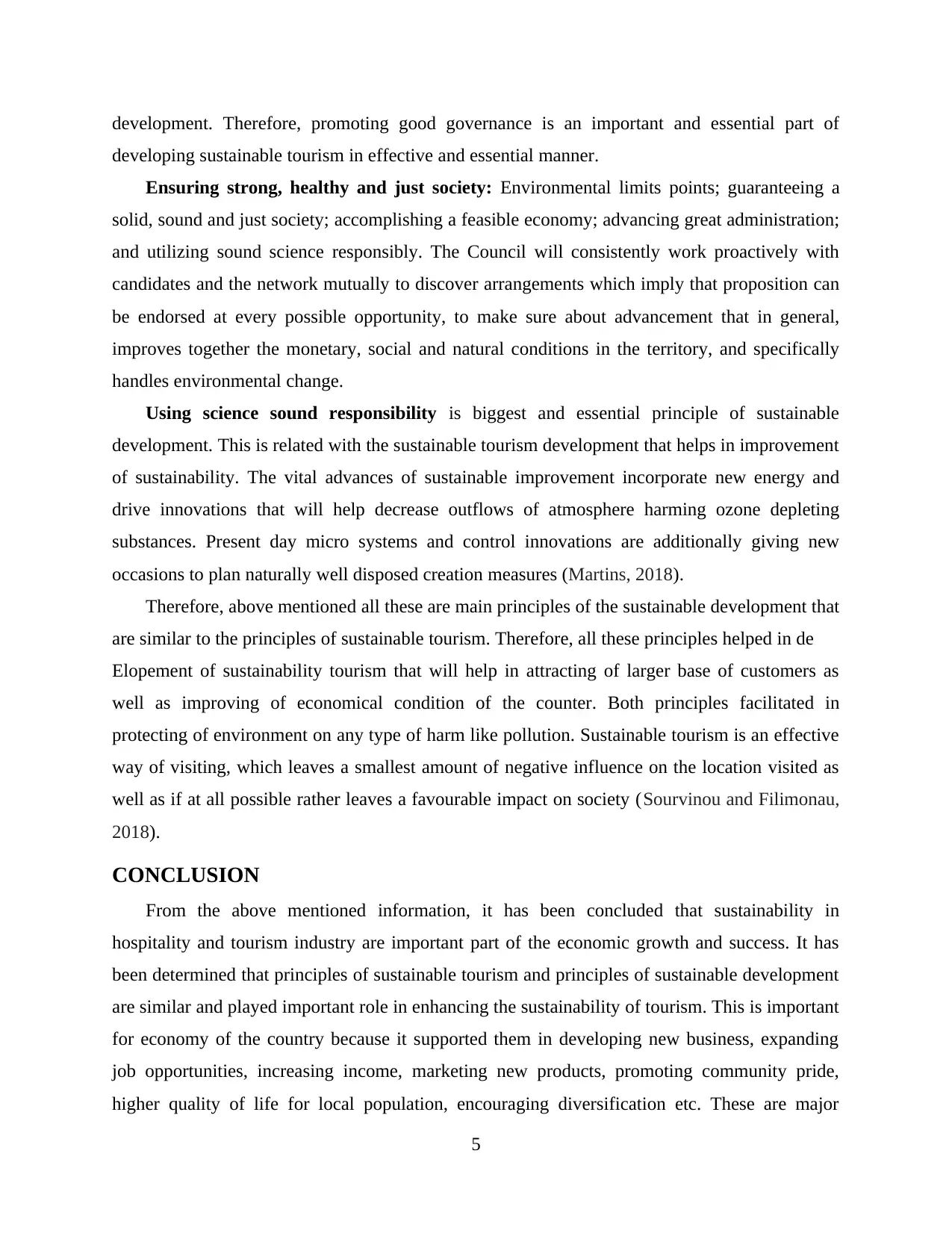
development. Therefore, promoting good governance is an important and essential part of
developing sustainable tourism in effective and essential manner.
Ensuring strong, healthy and just society: Environmental limits points; guaranteeing a
solid, sound and just society; accomplishing a feasible economy; advancing great administration;
and utilizing sound science responsibly. The Council will consistently work proactively with
candidates and the network mutually to discover arrangements which imply that proposition can
be endorsed at every possible opportunity, to make sure about advancement that in general,
improves together the monetary, social and natural conditions in the territory, and specifically
handles environmental change.
Using science sound responsibility is biggest and essential principle of sustainable
development. This is related with the sustainable tourism development that helps in improvement
of sustainability. The vital advances of sustainable improvement incorporate new energy and
drive innovations that will help decrease outflows of atmosphere harming ozone depleting
substances. Present day micro systems and control innovations are additionally giving new
occasions to plan naturally well disposed creation measures (Martins, 2018).
Therefore, above mentioned all these are main principles of the sustainable development that
are similar to the principles of sustainable tourism. Therefore, all these principles helped in de
Elopement of sustainability tourism that will help in attracting of larger base of customers as
well as improving of economical condition of the counter. Both principles facilitated in
protecting of environment on any type of harm like pollution. Sustainable tourism is an effective
way of visiting, which leaves a smallest amount of negative influence on the location visited as
well as if at all possible rather leaves a favourable impact on society (Sourvinou and Filimonau,
2018).
CONCLUSION
From the above mentioned information, it has been concluded that sustainability in
hospitality and tourism industry are important part of the economic growth and success. It has
been determined that principles of sustainable tourism and principles of sustainable development
are similar and played important role in enhancing the sustainability of tourism. This is important
for economy of the country because it supported them in developing new business, expanding
job opportunities, increasing income, marketing new products, promoting community pride,
higher quality of life for local population, encouraging diversification etc. These are major
5
developing sustainable tourism in effective and essential manner.
Ensuring strong, healthy and just society: Environmental limits points; guaranteeing a
solid, sound and just society; accomplishing a feasible economy; advancing great administration;
and utilizing sound science responsibly. The Council will consistently work proactively with
candidates and the network mutually to discover arrangements which imply that proposition can
be endorsed at every possible opportunity, to make sure about advancement that in general,
improves together the monetary, social and natural conditions in the territory, and specifically
handles environmental change.
Using science sound responsibility is biggest and essential principle of sustainable
development. This is related with the sustainable tourism development that helps in improvement
of sustainability. The vital advances of sustainable improvement incorporate new energy and
drive innovations that will help decrease outflows of atmosphere harming ozone depleting
substances. Present day micro systems and control innovations are additionally giving new
occasions to plan naturally well disposed creation measures (Martins, 2018).
Therefore, above mentioned all these are main principles of the sustainable development that
are similar to the principles of sustainable tourism. Therefore, all these principles helped in de
Elopement of sustainability tourism that will help in attracting of larger base of customers as
well as improving of economical condition of the counter. Both principles facilitated in
protecting of environment on any type of harm like pollution. Sustainable tourism is an effective
way of visiting, which leaves a smallest amount of negative influence on the location visited as
well as if at all possible rather leaves a favourable impact on society (Sourvinou and Filimonau,
2018).
CONCLUSION
From the above mentioned information, it has been concluded that sustainability in
hospitality and tourism industry are important part of the economic growth and success. It has
been determined that principles of sustainable tourism and principles of sustainable development
are similar and played important role in enhancing the sustainability of tourism. This is important
for economy of the country because it supported them in developing new business, expanding
job opportunities, increasing income, marketing new products, promoting community pride,
higher quality of life for local population, encouraging diversification etc. These are major
5
Paraphrase This Document
Need a fresh take? Get an instant paraphrase of this document with our AI Paraphraser

advantages of having sustainability in tourism and hospitality industry that are essential in future
tourism.
6
tourism.
6
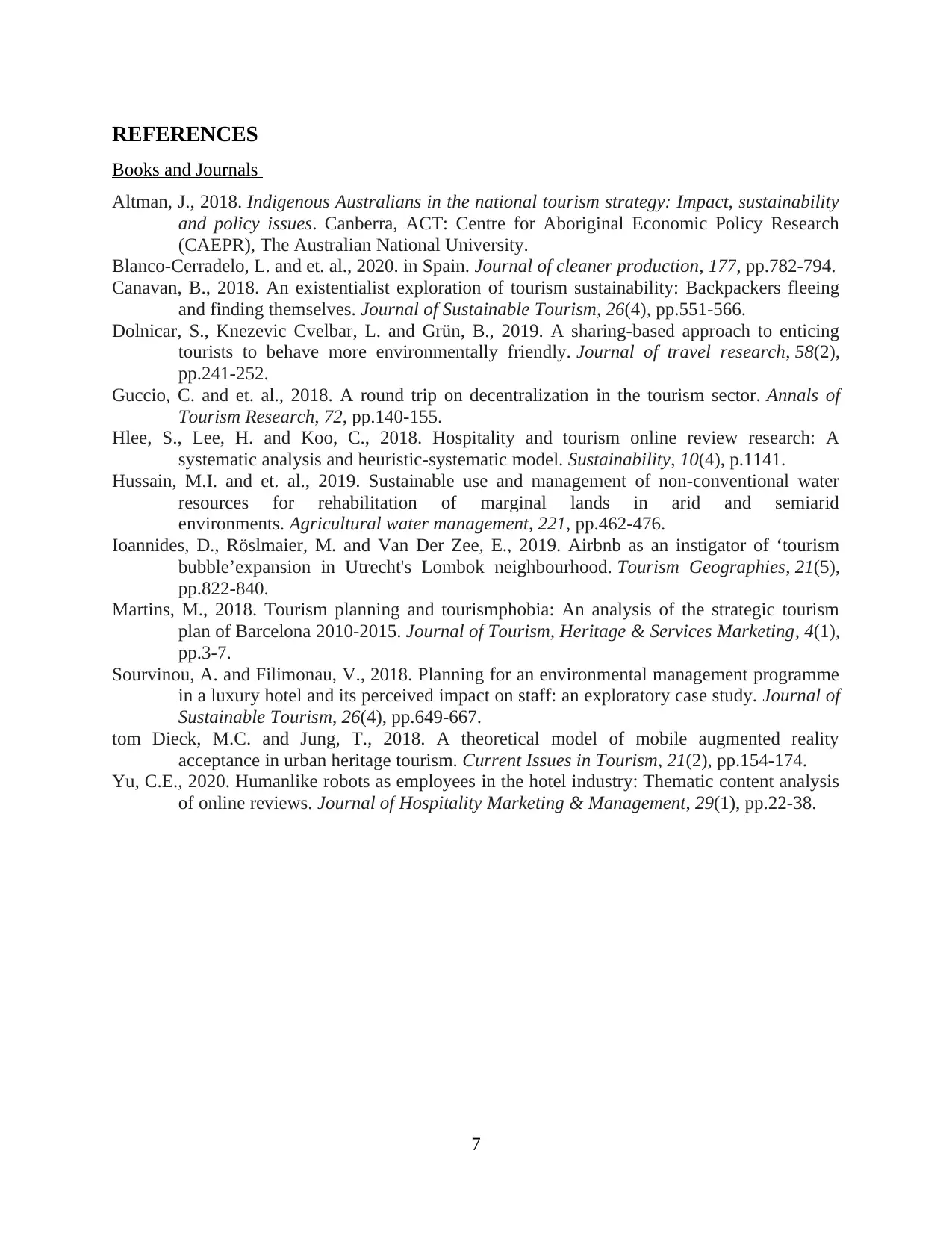
REFERENCES
Books and Journals
Altman, J., 2018. Indigenous Australians in the national tourism strategy: Impact, sustainability
and policy issues. Canberra, ACT: Centre for Aboriginal Economic Policy Research
(CAEPR), The Australian National University.
Blanco-Cerradelo, L. and et. al., 2020. in Spain. Journal of cleaner production, 177, pp.782-794.
Canavan, B., 2018. An existentialist exploration of tourism sustainability: Backpackers fleeing
and finding themselves. Journal of Sustainable Tourism, 26(4), pp.551-566.
Dolnicar, S., Knezevic Cvelbar, L. and Grün, B., 2019. A sharing-based approach to enticing
tourists to behave more environmentally friendly. Journal of travel research, 58(2),
pp.241-252.
Guccio, C. and et. al., 2018. A round trip on decentralization in the tourism sector. Annals of
Tourism Research, 72, pp.140-155.
Hlee, S., Lee, H. and Koo, C., 2018. Hospitality and tourism online review research: A
systematic analysis and heuristic-systematic model. Sustainability, 10(4), p.1141.
Hussain, M.I. and et. al., 2019. Sustainable use and management of non-conventional water
resources for rehabilitation of marginal lands in arid and semiarid
environments. Agricultural water management, 221, pp.462-476.
Ioannides, D., Röslmaier, M. and Van Der Zee, E., 2019. Airbnb as an instigator of ‘tourism
bubble’expansion in Utrecht's Lombok neighbourhood. Tourism Geographies, 21(5),
pp.822-840.
Martins, M., 2018. Tourism planning and tourismphobia: An analysis of the strategic tourism
plan of Barcelona 2010-2015. Journal of Tourism, Heritage & Services Marketing, 4(1),
pp.3-7.
Sourvinou, A. and Filimonau, V., 2018. Planning for an environmental management programme
in a luxury hotel and its perceived impact on staff: an exploratory case study. Journal of
Sustainable Tourism, 26(4), pp.649-667.
tom Dieck, M.C. and Jung, T., 2018. A theoretical model of mobile augmented reality
acceptance in urban heritage tourism. Current Issues in Tourism, 21(2), pp.154-174.
Yu, C.E., 2020. Humanlike robots as employees in the hotel industry: Thematic content analysis
of online reviews. Journal of Hospitality Marketing & Management, 29(1), pp.22-38.
7
Books and Journals
Altman, J., 2018. Indigenous Australians in the national tourism strategy: Impact, sustainability
and policy issues. Canberra, ACT: Centre for Aboriginal Economic Policy Research
(CAEPR), The Australian National University.
Blanco-Cerradelo, L. and et. al., 2020. in Spain. Journal of cleaner production, 177, pp.782-794.
Canavan, B., 2018. An existentialist exploration of tourism sustainability: Backpackers fleeing
and finding themselves. Journal of Sustainable Tourism, 26(4), pp.551-566.
Dolnicar, S., Knezevic Cvelbar, L. and Grün, B., 2019. A sharing-based approach to enticing
tourists to behave more environmentally friendly. Journal of travel research, 58(2),
pp.241-252.
Guccio, C. and et. al., 2018. A round trip on decentralization in the tourism sector. Annals of
Tourism Research, 72, pp.140-155.
Hlee, S., Lee, H. and Koo, C., 2018. Hospitality and tourism online review research: A
systematic analysis and heuristic-systematic model. Sustainability, 10(4), p.1141.
Hussain, M.I. and et. al., 2019. Sustainable use and management of non-conventional water
resources for rehabilitation of marginal lands in arid and semiarid
environments. Agricultural water management, 221, pp.462-476.
Ioannides, D., Röslmaier, M. and Van Der Zee, E., 2019. Airbnb as an instigator of ‘tourism
bubble’expansion in Utrecht's Lombok neighbourhood. Tourism Geographies, 21(5),
pp.822-840.
Martins, M., 2018. Tourism planning and tourismphobia: An analysis of the strategic tourism
plan of Barcelona 2010-2015. Journal of Tourism, Heritage & Services Marketing, 4(1),
pp.3-7.
Sourvinou, A. and Filimonau, V., 2018. Planning for an environmental management programme
in a luxury hotel and its perceived impact on staff: an exploratory case study. Journal of
Sustainable Tourism, 26(4), pp.649-667.
tom Dieck, M.C. and Jung, T., 2018. A theoretical model of mobile augmented reality
acceptance in urban heritage tourism. Current Issues in Tourism, 21(2), pp.154-174.
Yu, C.E., 2020. Humanlike robots as employees in the hotel industry: Thematic content analysis
of online reviews. Journal of Hospitality Marketing & Management, 29(1), pp.22-38.
7
⊘ This is a preview!⊘
Do you want full access?
Subscribe today to unlock all pages.

Trusted by 1+ million students worldwide
1 out of 9
Related Documents
Your All-in-One AI-Powered Toolkit for Academic Success.
+13062052269
info@desklib.com
Available 24*7 on WhatsApp / Email
![[object Object]](/_next/static/media/star-bottom.7253800d.svg)
Unlock your academic potential
Copyright © 2020–2026 A2Z Services. All Rights Reserved. Developed and managed by ZUCOL.





